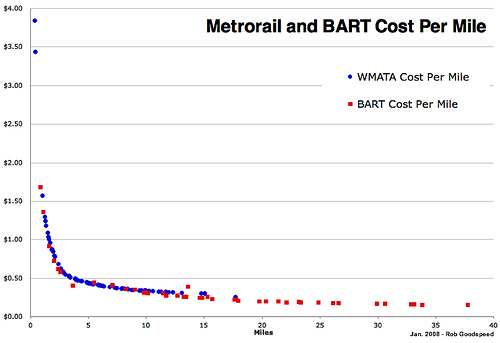Transportation stuff
1. GGW suggests the honor system for streetcar payment. See "Streetcars on the "honor system"." I don't. With SmartTrip cards, which more and more people are using, especially on buses, dwell time (the time a bus spends sitting while people are boarding and exiting) is shrinking. Charge.
There's a reason that farebox revenue collection covers about 80% of the cost of operations for the subway system... Sure, fares are distance based, but fares are also collected.
2. Raising fares has also been discussed in GGW. See "Board to Catoe: Cut service to balance budget."
I think limiting fare increases to some specific percentage is foolish. Yes, I don't like the idea of fare increases, but I like the idea of service cuts even less. The Metro Board is being irresponsible by overly constraining how to rectify the budget gap through fare increases, service cuts, and other changes.
Metrobus base fare is $1.25/$1.35 (10 cents less if you pay with SmartTrip cards). In most other cities base fares are $1.50 or more. In Baltimore, it's $1.60. (But you can get an all-day pass for $3.50.)
On the other hand, the fare system for Metrorail is biased against short trips, or in other words, provides cheaper fares on a per mile basis for longer trips, as Rob Goodspeed discussed some time ago, in "D.C.’s Metrorail Fares in Context." The last graphic from his entry, reprinted below, shows that on a per mile basis, the highest fares are those between 0 to 5 miles.

Graphic by Rob Goodspeed.
I think Metrobus fares should be raised at least 10% -- an increase from $1.35 to $1.50 is 11%.
After all, in real dollar terms, the bus fare today is no higher than it was in 1988. And Metrorail fares should be raised, but in a manner that does not continue the overcharging on a per mile basis of shorter trips.
3. MARC rail commuters seeking to get from Maryland to DC are dealing with shortages of locomotives (see "Testing safety dispute idles MARC's new locomotives " from the Baltimore Sun), which has reduced the number of train cars running on the Penn Line, leading to overcrowded trains. See "Commuters frustrated with crowding on MARC" from the Baltimore Sun.

Baltimore Sun photo by Amy Davis / September 15, 2009. Morning commuters wait at the Halethorpe station to board the 7:13 a.m. MARC train to Washington. MARC is having to use older locomotives that can pull fewer cars.
4. Looks like toll roads are going to cost a lot of money... see "ICC Tolls Could Top 35 Cents Per Mile : Fees to Vary by Time Of Day; Trucks to Pay More Under Md. Plan" from the Washington Post about the fare structure for the Inter County Connector in Montgomery and Prince George's County.
But at least the road will "pay for itself."
5. Leader of the MetroRiders organization has it right if you ask me, in his comment in a Post article about the tenure of John Catoe as the general manager of WMATA, the Washington regional transit service. From "Metro Chief Is Facing 'The Test of His Life'" in the Post:
Jack Corbett of MetroRiders.Org, a riders group, said the group also supports Catoe's efforts to streamline staff and expenses. But he called on Metro to beef up its safety staff and to be "fully transparent" on ongoing safety issues.
Corbett said the board, not Catoe, is Metro's "weak link." The 12 members -- six of them voting -- are appointed by elected officials or elected in their jurisdictions, so "they have divided loyalties," he said. That makes them reluctant to ask local governments to increase funding for Metro.
This is the issue. We need a better leadership and oversight structure for WMATA. Board members need to respond to and consider issues more globally than strictly within the lens of the jurisdiction they represent, be it DC, Maryland, or Virginia, and consider the transit system and the region as a whole.
In some places, usually none of significant size, the metropolitan planning organization, the body tasked by the federal government with responsibility for transportation and air quality planning for metropolitan regions, also operates the transit system. At least this is the case in Minneapolis (Metropolitan Council of the Twin Cities Region) and then in Portland, there is a regional government, "Metro," which has broader planning responsibilities, and the members of the government are elected on a regional basis. However, in Portland the transit system is independent of the Metro Government. (Also see Association of Metropolitan Planning Organizations.)
I think such a system might be good to have in the Washington region. (And in the Baltimore region too. Rather than having transit planned and provided by the State of Maryland, responsibility for transit operations as well as planning should be devolved to the metropolitan region, to the Baltimore MPO maybe.)
Even though the local jurisdictions provide the bulk of WMATA's budget and you want to have oversight and accountability with regard to that, at the end of the day, the Board Members need to be better than most of them seem to be capable of...
Labels: transit, transportation planning



0 Comments:
Post a Comment
<< Home